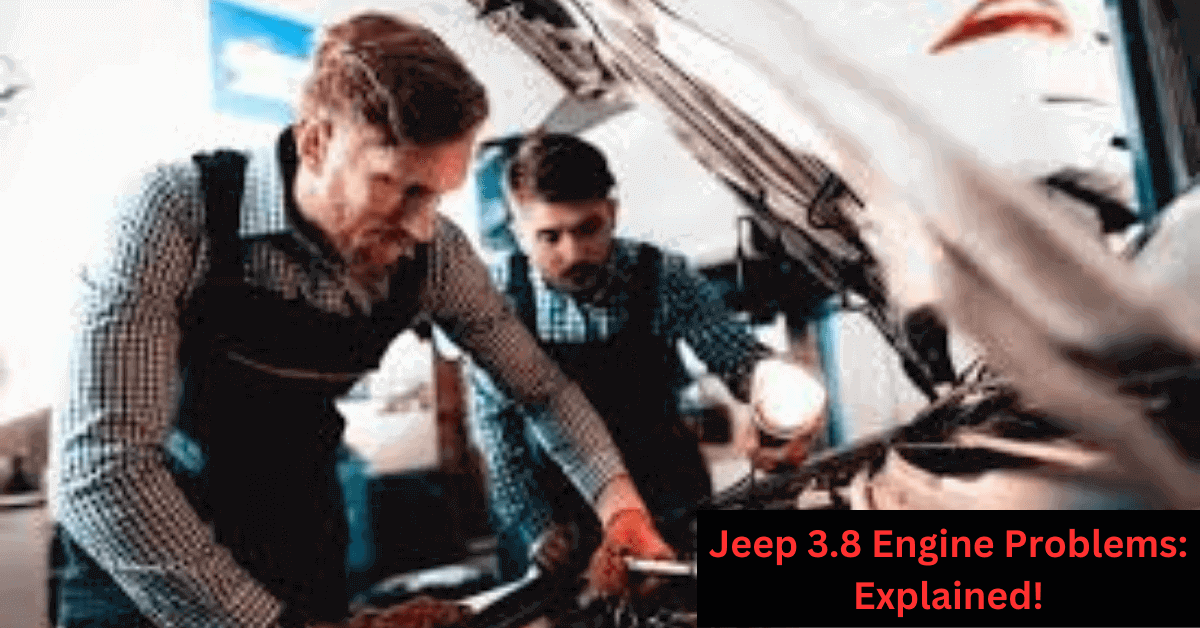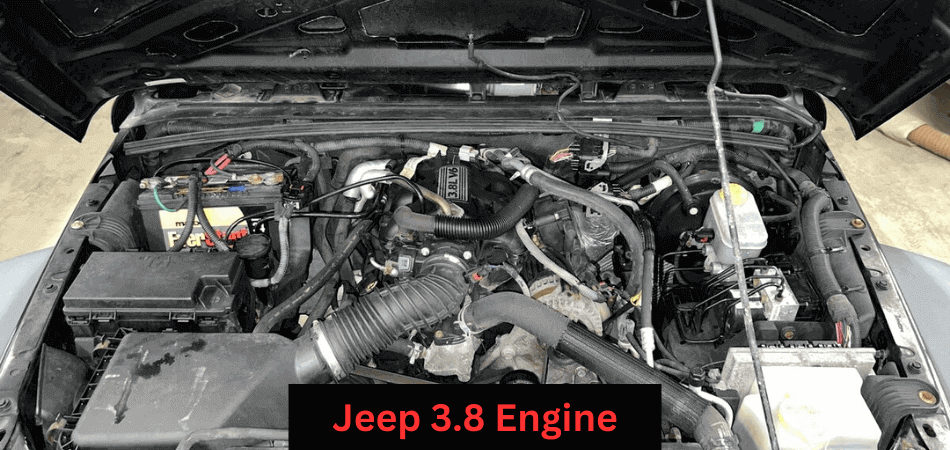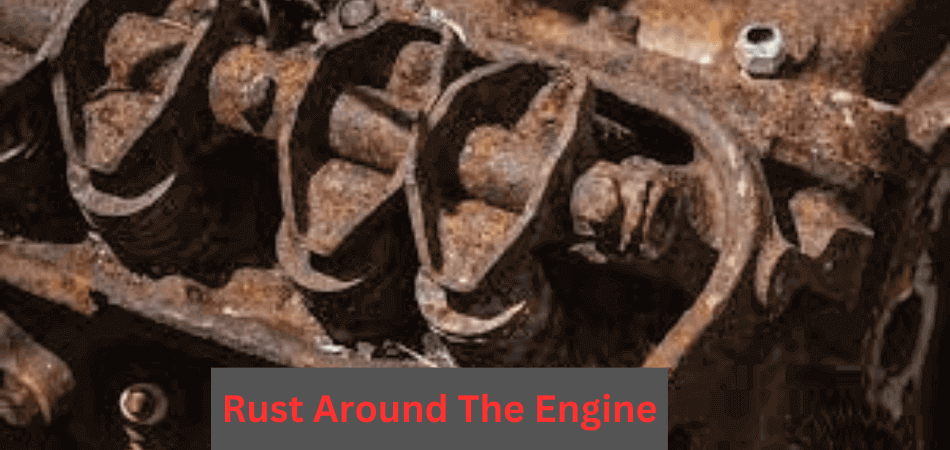
Jeeps are well-known for their toughness and off-road prowess. However, some engine options may need fixing. The 3.8-liter engine is commonly found in third-generation Jeep Wranglers. The Jeep 3.8 Engine also face problems.
It is known for its ability to perform well in off-road conditions, but some users have reported unexpected engine failure.
It’s also important to remember that no technology is perfect and engineers are constantly working to improve it.
When considering purchasing a Jeep with a 3.8-liter engine or any other engine, it’s crucial to research the engine’s history and potential issues beforehand.
However, the Jeep 3.8 engine common problems that have been reported by vehicle owners include: Short-distance engine breakdowns, high oil consumption, exhaust manifold leak problems, rust around the engine and many more.
So, in this article, we’ll learn about Jeep 3.8 engine problems, whether it’s a Ford, Wrangler, or others jeep engines. Further, we’ll discuss a complete engine overview, possible problems you might face & how to fix the issues!
Let’s get the ball rolling.
Jeep 3.8 Engine Overview
The 3.8L V6 engine is a six-cylinder engine produced by Chrysler for use in the Jeep Wrangler. Some key features and specifications of this engine for instance:
- Displacement: 3.8 liters (230 cubic inches)
- Configuration: V6
- Valvetrain: OHV (overhead valves)
- Power output: 202 horsepower at 5,200 RPM, 237 lb-ft of torque at 4,000 RPM
- Compression ratio: 9.6:1
- Fuel delivery: Multi-point fuel injection
- Transmission options: Automatic and manual
The 3.8L V6 engine was also available in the Jeep Wrangler from 2007 to 2011. It was known for its durability and good fuel economy indeed. However, it was also used in other models such as the Jeep Liberty and Jeep Grand Cherokee.
Moreover, it was replaced by the 3.6L Pentester V6 engine in the 2012 model year of Jeep Wrangler.
Main Possible Jeep 3.8 Engine Problems
The 3.8 engine in the Jeep is known for its durability and good fuel economy, however, like any other engine, it may develop certain problems over time. Some common issues that have been reported by vehicle owners include:
- Short-distance engine breakdowns
- High oil consumption
- Exhaust manifold leak problems
- Rust around the engine
- Timing cover & starter issues
Let’s discuss the main Jeep 3.8 engine problems thoroughly

Short Distance Engine Breakdown
The issue of engine failure in the Jeep 3.8L V6 engine is a common one. At this point, the engine may start to have problems and may not perform as it should.
Even after a short period of inactivity some Jeep Wrangler owners may experience is engine knocking sounds when starting the vehicle. This unwanted noise can be frustrating also may indicate a problem with the engine.
Solution: While this issue is an unfortunate reality for some Jeep 3.8L V6 engine owners, it is possible to extend the life of the engine by taking proper care of the vehicle and performing regular maintenance.
This can include regular oil changes, replacing worn or damaged parts, and addressing any issues that arise as soon as they are noticed.
High Oil Consumption
High oil consumption in the Jeep 3.8 engine can be caused by a variety of issues. Some possible symptoms and causes of this problem include:
- Burning Oil: Oil level drops quickly and needs to be refilled frequently.
- Blue/white smoke from the exhaust: This could be a sign of burning oil. That oil is getting into the combustion chamber.
- Oil leaks: High oil consumption can be caused by leaks in the engine. Such as from the valve cover gaskets or the oil pan gasket.
- Worn piston rings: Piston rings that are worn or damaged can result in oil seeping into the combustion chamber. This can cause high oil consumption.
- Clogged PCV system: A clogged Positive Crankcase Ventilation (PCV) system can cause the engine to consume more oil than normal.
- Worn valve seals: When valve seals are worn, they can cause oil to enter the combustion chamber, resulting in increased oil consumption.
Solution: It’s essential to consult a professional mechanic to diagnose. Also fix the root cause of high oil consumption.
Moreover, in some cases, high oil consumption may arise from a combination of several factors. Also, addressing one issue may not fully resolve the problem.
Exhaust Manifold Leak Problems
The Jeep 3.8 engine is prone to leaks in the intake manifold, specifically with the lower intake manifold gasket. This can result in coolant leaks and cause the manifold to make noise and deteriorate.
Additionally, a cracked exhaust manifold can negatively impact the engine’s performance and potentially trigger trouble codes, which may be mistaken for an internal engine problem.
Signs of this issue include steam from the engine bay and a wet transmission bell housing.
Solution: It is not a simple problem with a clear solution, so it is recommendable to replace both sides of the issue.
Before proceeding with extensive engine diagnostics, it is advisable to check the condition of the heat-shield covers and determine if the manifolds are damaged.
Rust Around The Engine

The 3.8 engine is susceptible to rust over time, This also result in the accumulation of water vapour that mixes with oil or other chemicals. Rust build-up can occur in various parts of the engine, particularly in the power output components. And is more likely to happen during cold weather.
Additionally, friction can also contribute to rust formation, which can obstruct the engine’s oil flow channels and negatively impact engine performance.
Solution: Proper maintenance also daily inspections are crucial for the engine. However, utilizing an anti-rust solution on key components can help minimize rust formation.
The 3.8 Engine Cam From A Minivan
Chrysler’s 3.8L minivan engine pool only added to the ridicule. We’re beginning to see more and more 3.8L JKs approaching the 200,000-mile mark now that they’ve been out for a while.
The 3.8L has also developed a reputation for not being able to compete with the 5.0L. However, excessive oil consumption is the most common complaint. Further, in just over 100,000 miles, two ’07 JK Wranglers equipped with 3.8L engines have died.
Moreover, there was a rapid consumption of oil in both cars (two quarts every 100 miles). Even though some of us are harder on our Jeeps than others, 3.8L trouble is not unique to us.
Timing Cover & Starter Issues
Timing cover leaks are often caused by faulty o-rings indeed. Which can break, crack, or become misshapen, resulting in oil leaks from the timing chain cover for instance.
Regarding the timing starter issue, it is also not uncommon for some Jeep Wranglers to require more time for the starter to engage. However, it is best to wait a few seconds, if you tend to start the engine again.
Solution: If you experience a timing cover leak, then contact your dealer as you may solve it under warranty.
It is also important to be familiar with the specific operation of the 3.8L engine, as it can help you properly time the ignition process and avoid related issues.
How Reliable Is The Jeep 3.8 Engine?
The Jeep 3.8 engine has a reputation for being a durable and reliable power plant indeed. However, it is not without its issues. Some common problems include intake and exhaust manifold leaks, rust build-up, and timing cover leaks for instance These issues can happen because of a variety of factors such as age, poor maintenance, and exposure. In order to harsh weather conditions.
However, through regular maintenance and inspections, you can avoid these issues or identify them early on. Which allows for prompt repairs before extensive damage occurs.
Additionally, many of these problems you can solve under warranty, which can help with the cost of repairs.
It’s also worth noting that these issues are not unique to the Jeep 3.8 engine, and can happen with other vehicles as well.
In general, the Jeep 3.8 engine is dependable and can offer excellent service when it is well maintained.
Pros and cons of Jeep 3.8 Engine
Benefits of Jeep 3.8 Engine
- Bumpy drives are no problem for the 3.8 Wrangler engine. Jeep Wranglers are well-suited to off-road driving, including their engines
- The baby can run for quite some time if it is well cared for and maintained
- With the right knowledge and equipment, most faults can be easily repaired if they arise
- Purchasing and replacing 8L engines is relatively straightforward
The disadvantage of the Jeep 3.8 Engine
- Provides abundant oil combustion
- An aging population
- When it comes to speed, horsepower, and other features, it cannot compete with some SUVs of its time.
- Drives for long periods of time are not recommended.
- It is important to check minor faults as soon as possible to prevent further damage.
The Ultimate Gas Mileage Of Jeep 3.8 Engine
The fuel economy for the Jeep 3.8 engine varies depending on the model also the year. The EPA also estimates that the gas mileage for the Jeep Grand Cherokee with a 3.8-liter V6 engine is around 15 MPG in the city and 20 MPG on the highway.
The Jeep Liberty with a 3.8-liter V6 engine estimated fuel economy. That is around 14 MPG in the city and 19 MPG on the highway.
Moreover, the gas mileage for the Jeep Wrangler with a 3.8-liter V6 engine is around 13 MPG in the city. Also, 18 MPG on the highway.
However, it’s worth noting that these estimates depend on the vehicle driving in optimal conditions and with regular maintenance. Also, fuel economy can differ depending on various factors including the driver’s style, road surface, and weather conditions.
Conclusion
The 3.8L engine used in Jeep models from 2007 to 2011. It is not the best in the brand’s history, but it does provide reliable service. Despite its known issues, it represents a significant improvement over the previous 3.3L model.
However, The 3.8L V6 engine has proven to be quite effective. This also used in various vehicles for a prolonged period of time. Further, With proper maintenance, it can provide excellent performance for over 100,000 miles.
RELATED:
Most Common Jeep 4.7 Ho Engine Problems & Solution: Explained!
FAQ
Does Mahindra’s engine have a good reputation for reliability?
A Mahindra engine is also known for being the most fuel-efficient. However, The reliable engine available in the market today and can maintain high performance over long and challenging working hours. It is still possible to see Armada and Marshall on the road, for instance.
Why are Ford 5.8 engines so prone to malfunction?
Coolant leaks from timing covers, Manifold cracks, Oil and gasket leaks in the rear main seal, The bolts that hold the intake manifold together are broken, Blocks with less strength for instance .
Do you have motor problems with your Ford 400?
Overheating, poor oil pressure, and valve train noise are all frequent engine problems face Ford 400 engine for instance. Checking and replacing the thermostat, checking and replacing the oil pump, also checking and replacing the valve lifters are all potential remedies to these issues.
Subaru club car engine problems?
Difficulties that most usually emerge in a gas-driven club car Subaru engine indeed. However, EFI (Electronic Fuel Injection) issue, The O2 (Oxygen) sensor is malfunctioning, fuel Pump Problem caused by a damaged spark plug, controlling speed is a problem, radiator problem, battery issues.
Which Jeep engine has the most power?
Jeep Wrangler Rubicon Delivers Legendary Off-Road Performance indeed… However, the Jeep Wrangler Rubicon is the most powerful Wrangler yet. With a 6.4-liter V-8 engine also produce 470 horsepower and 637 Newton-meters of torque.







Leave a Reply